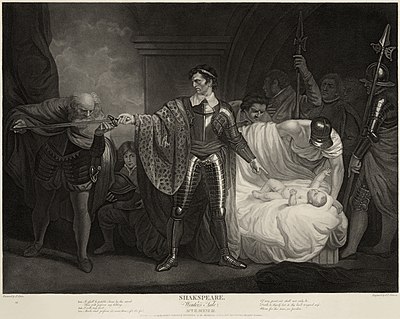Zimowa opowieść
Zimowa opowieść (ang. The Winter’s Tale) – jeden z ostatnich utworów Williama Szekspira powstały w latach 1609–1610. Została opublikowana w Pierwszym Folio w 1623.
Jest określana jako jedna z tzw. sztuk problemowych, gdyż nie da się jednoznacznie określić jej gatunku. Zazwyczaj przyjmuje się, że jest to romans z licznymi cechami tragedii.
Utwór ten jest trawestacją romansu pasterskiego autorstwa Roberta Greene’a z 1590. Z tłumaczeniem tytułu tego utworu jako Opowieść zimowa nie zgodził się Leon Ulrich, który przełożył go jako Zimowa powieść.
Zobacz też
Bibliografia
- Leslie Dunton-Downer, Alan Riding: Szekspir. Warszawa: Hachette Livre, 2005. ISBN 83-7184-496-4.
Linki zewnętrzne
- Tekst utworu (ang.)
- Wszystkie polskie XIX-wieczne przekłady Opowieści zimowej wraz z omówieniami ich strategii i recepcji dostępne są w repozytorium cyfrowym Polski Szekspir UW .
Media użyte na tej stronie
An illustration by John Opie, engraved by Jean Pierre Simon, for Act II, Scene III of Shakespeare's [The] Winter's Tale
LEONTES:
- [To ANTIGONUS.] You, sir, come you hither:
- You that have been so tenderly officious
- With Lady Margery, your midwife, there,
- To save this bastard's life,—for 'tis a bastard,
- So sure as this beard's grey,—what will you adventure
- To save this brat's life?
ANTIGONUS.
- Anything, my lord,
- That my ability may undergo,
- And nobleness impose: at least, thus much;
- I'll pawn the little blood which I have left
- To save the innocent:—anything possible.
LEONTES.
- It shall be possible. Swear by this sword
- Thou wilt perform my bidding.
ANTIGONUS.
- I will, my lord.
LEONTES.
- Mark, and perform it; (seest thou?) for the fail
- Of any point in't shall not only be
- Death to thyself, but to thy lewd-tongu'd wife;
- Whom for this time, we pardon.


